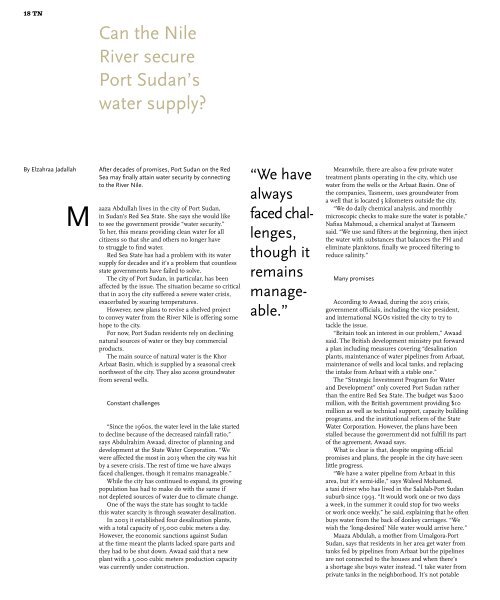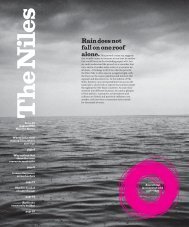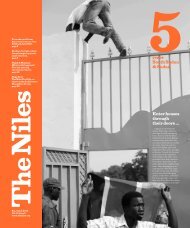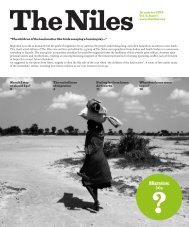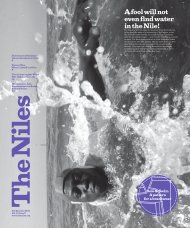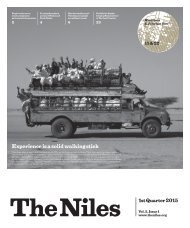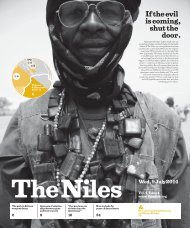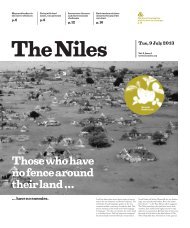You think of water when the well is empty...
Although we strive to be prepared, sometimes we can be caught unawares. That is why it’s worth thinking about water before the well goes dry in order to have enough time to plan ahead. Part of this preparation is knowing what the right questions are and striving to answer them. To be prepared and plan ahead also means to notice small changes when they occur. This can only happen if you spend time observing and learning. The Nile shows us its many facets depending on the light, the time of day and the mood of the observer. Noticing these changes helps us to know more and be prepared. Through the pages of this paper, correspondents from the Nile Basin countries share their experiences and observations about the Nile and try to find answers to the most relevant questions about the river. We celebrate the day of the Nile by thinking about water, before the well goes dry.
Although we strive to be prepared, sometimes we can be caught unawares. That is why it’s worth thinking about water before the well goes dry in order to have enough time to plan ahead. Part of this preparation is knowing what the right questions are and striving to answer them.
To be prepared and plan ahead also means to notice small changes when they occur. This can only happen if you spend time observing and learning. The Nile shows us its many facets depending on the light, the time of day and the mood of the observer. Noticing these changes helps us to know more and be prepared.
Through the pages of this paper, correspondents from the Nile Basin countries share their experiences and observations about the Nile and try to find answers to the most relevant questions about the river. We celebrate the day of the Nile by thinking about water, before the well goes dry.
Create successful ePaper yourself
Turn your PDF publications into a flip-book with our unique Google optimized e-Paper software.
18 TN TN 19<br />
Can <strong>the</strong> Nile<br />
River secure<br />
Port Sudan’s<br />
<strong>water</strong> supply?<br />
Can <strong>the</strong> Nile River secure<br />
Port Sudan’s <strong>water</strong> supply?<br />
By Elzahraa Jadallah<br />
M<br />
After decades <strong>of</strong> prom<strong>is</strong>es, Port Sudan on <strong>the</strong> Red<br />
Sea may finally attain <strong>water</strong> security by connecting<br />
to <strong>the</strong> River Nile.<br />
aaza Abdullah lives in <strong>the</strong> city <strong>of</strong> Port Sudan,<br />
in Sudan’s Red Sea State. She says she would like<br />
to see <strong>the</strong> government provide “<strong>water</strong> security.”<br />
To her, th<strong>is</strong> means providing clean <strong>water</strong> for all<br />
citizens so that she and o<strong>the</strong>rs no longer have<br />
to struggle to find <strong>water</strong>.<br />
Red Sea State has had a problem with its <strong>water</strong><br />
supply for decades and it’s a problem that countless<br />
state governments have failed to solve.<br />
The city <strong>of</strong> Port Sudan, in particular, has been<br />
affected by <strong>the</strong> <strong>is</strong>sue. The situation became so critical<br />
that in 2013 <strong>the</strong> city suffered a severe <strong>water</strong> cr<strong>is</strong><strong>is</strong>,<br />
exacerbated by soaring temperatures.<br />
However, new plans to revive a shelved project<br />
to convey <strong>water</strong> from <strong>the</strong> River Nile <strong>is</strong> <strong>of</strong>fering some<br />
hope to <strong>the</strong> city.<br />
For now, Port Sudan residents rely on declining<br />
natural sources <strong>of</strong> <strong>water</strong> or <strong>the</strong>y buy commercial<br />
products.<br />
The main source <strong>of</strong> natural <strong>water</strong> <strong>is</strong> <strong>the</strong> Khor<br />
Arbaat Basin, which <strong>is</strong> supplied by a seasonal creek<br />
northwest <strong>of</strong> <strong>the</strong> city. They also access ground<strong>water</strong><br />
from several <strong>well</strong>s.<br />
Constant challenges<br />
“Since <strong>the</strong> 1960s, <strong>the</strong> <strong>water</strong> level in <strong>the</strong> lake started<br />
to decline because <strong>of</strong> <strong>the</strong> decreased rainfall ratio,”<br />
says Abdulrahim Awaad, director <strong>of</strong> planning and<br />
development at <strong>the</strong> State Water Corporation. “We<br />
were affected <strong>the</strong> most in 2013 <strong>when</strong> <strong>the</strong> city was hit<br />
by a severe cr<strong>is</strong><strong>is</strong>. The rest <strong>of</strong> time we have always<br />
faced challenges, though it remains manageable.”<br />
While <strong>the</strong> city has continued to expand, its growing<br />
population has had to make do with <strong>the</strong> same if<br />
not depleted sources <strong>of</strong> <strong>water</strong> due to climate change.<br />
One <strong>of</strong> <strong>the</strong> ways <strong>the</strong> state has sought to tackle<br />
th<strong>is</strong> <strong>water</strong> scarcity <strong>is</strong> through sea<strong>water</strong> desalination.<br />
In 2003 it establ<strong>is</strong>hed four desalination plants,<br />
with a total capacity <strong>of</strong> 15,000 cubic meters a day.<br />
However, <strong>the</strong> economic sanctions against Sudan<br />
at <strong>the</strong> time meant <strong>the</strong> plants lacked spare parts and<br />
<strong>the</strong>y had to be shut down. Awaad said that a new<br />
plant with a 3,000 cubic meters production capacity<br />
was currently under construction.<br />
“We have<br />
always<br />
faced challenges,<br />
though it<br />
remains<br />
manageable.”<br />
Meanwhile, <strong>the</strong>re are also a few private <strong>water</strong><br />
treatment plants operating in <strong>the</strong> city, which use<br />
<strong>water</strong> from <strong>the</strong> <strong>well</strong>s or <strong>the</strong> Arbaat Basin. One <strong>of</strong><br />
<strong>the</strong> companies, Tasneem, uses ground<strong>water</strong> from<br />
a <strong>well</strong> that <strong>is</strong> located 5 kilometers outside <strong>the</strong> city.<br />
“We do daily chemical analys<strong>is</strong>, and monthly<br />
microscopic checks to make sure <strong>the</strong> <strong>water</strong> <strong>is</strong> potable,”<br />
Naf<strong>is</strong>a Mahmoud, a chemical analyst at Tasneem<br />
said. “We use sand filters at <strong>the</strong> beginning, <strong>the</strong>n inject<br />
<strong>the</strong> <strong>water</strong> with substances that balances <strong>the</strong> PH and<br />
eliminate planktons, finally we proceed filtering to<br />
reduce salinity.”<br />
Many prom<strong>is</strong>es<br />
According to Awaad, during <strong>the</strong> 2013 cr<strong>is</strong><strong>is</strong>,<br />
government <strong>of</strong>ficials, including <strong>the</strong> vice president,<br />
and international NGOs v<strong>is</strong>ited <strong>the</strong> city to try to<br />
tackle <strong>the</strong> <strong>is</strong>sue.<br />
“Britain took an interest in our problem,” Awaad<br />
said. The Brit<strong>is</strong>h development min<strong>is</strong>try put forward<br />
a plan including measures covering “desalination<br />
plants, maintenance <strong>of</strong> <strong>water</strong> pipelines from Arbaat,<br />
maintenance <strong>of</strong> <strong>well</strong>s and local tanks, and replacing<br />
<strong>the</strong> intake from Arbaat with a stable one.”<br />
The “Strategic Investment Program for Water<br />
and Development” only covered Port Sudan ra<strong>the</strong>r<br />
than <strong>the</strong> entire Red Sea State. The budget was $200<br />
million, with <strong>the</strong> Brit<strong>is</strong>h government providing $10<br />
million as <strong>well</strong> as technical support, capacity building<br />
programs, and <strong>the</strong> institutional reform <strong>of</strong> <strong>the</strong> State<br />
Water Corporation. However, <strong>the</strong> plans have been<br />
stalled because <strong>the</strong> government did not fulfill its part<br />
<strong>of</strong> <strong>the</strong> agreement, Awaad says.<br />
What <strong>is</strong> clear <strong>is</strong> that, despite ongoing <strong>of</strong>ficial<br />
prom<strong>is</strong>es and plans, <strong>the</strong> people in <strong>the</strong> city have seen<br />
little progress.<br />
“We have a <strong>water</strong> pipeline from Arbaat in th<strong>is</strong><br />
area, but it’s semi-idle,” says Waleed Mohamed,<br />
a taxi driver who has lived in <strong>the</strong> Salalab-Port Sudan<br />
suburb since 1993. “It would work one or two days<br />
a week, in <strong>the</strong> summer it could stop for two weeks<br />
or work once weekly,” he said, explaining that he <strong>of</strong>ten<br />
buys <strong>water</strong> from <strong>the</strong> back <strong>of</strong> donkey carriages. “We<br />
w<strong>is</strong>h <strong>the</strong> ‘long-desired’ Nile <strong>water</strong> would arrive here.”<br />
Maaza Abdulah, a mo<strong>the</strong>r from Umalgora-Port<br />
Sudan, says that residents in her area get <strong>water</strong> from<br />
tanks fed by pipelines from Arbaat but <strong>the</strong> pipelines<br />
are not connected to <strong>the</strong> houses and <strong>when</strong> <strong>the</strong>re’s<br />
a shortage she buys <strong>water</strong> instead. “I take <strong>water</strong> from<br />
private tanks in <strong>the</strong> neighborhood. It’s not potable<br />
“We w<strong>is</strong>h<br />
<strong>the</strong> ‘longdesired’<br />
Nile <strong>water</strong><br />
would<br />
arrive<br />
here.”<br />
and we have it for daily use and we drink mineral<br />
<strong>water</strong> only.”<br />
In winter <strong>the</strong> <strong>water</strong> <strong>is</strong> available most <strong>of</strong> <strong>the</strong> time,<br />
while in summer <strong>the</strong> tanks are <strong>empty</strong> for long periods<br />
and she <strong>is</strong> forced to buy <strong>water</strong> from donkey carriages.<br />
She complains about <strong>the</strong> quality <strong>of</strong> all <strong>the</strong>se sources<br />
and says she would like to have access to potable <strong>water</strong><br />
from pipelines that are properly connected to <strong>the</strong><br />
houses and work all <strong>the</strong> time.<br />
Health impact <strong>of</strong> dirty <strong>water</strong><br />
There have been cases <strong>of</strong> diarrhea in <strong>the</strong> city,<br />
which are suspected <strong>of</strong> being related to <strong>water</strong> quality.<br />
When contacted about <strong>the</strong> <strong>is</strong>sue, <strong>the</strong> State Water<br />
Corporation said <strong>the</strong> cause was illegal <strong>well</strong>s drilled<br />
inside <strong>the</strong> city during <strong>the</strong> 2013 cr<strong>is</strong><strong>is</strong>, which had been<br />
polluted by <strong>the</strong> sewage. The utility claimed that <strong>the</strong><br />
contaminated <strong>water</strong> was being sold to consumers<br />
from <strong>the</strong> back <strong>of</strong> trucks and donkey carriages. They<br />
denied any problems concerning Arbaat <strong>water</strong>.<br />
However, a Health Min<strong>is</strong>try spokesperson stated<br />
that <strong>the</strong>ir investigation had found o<strong>the</strong>rw<strong>is</strong>e. “We<br />
found health problems in some <strong>water</strong> sources people<br />
use; we had to treat a lot <strong>of</strong> <strong>the</strong>m with chlorine<br />
with <strong>the</strong> help <strong>of</strong> Sudanese Red Crescent. It was main<br />
stations fed by Arbaat. We make sure it’s all treated.<br />
And o<strong>the</strong>r pollution problems caused by <strong>the</strong> unmonitored<br />
transportation.”<br />
The Health Min<strong>is</strong>try said that <strong>the</strong> municipal<br />
authorities carried out regular inspections <strong>of</strong> all <strong>water</strong><br />
sources, including tanks and pipelines all over <strong>the</strong><br />
city. “We closed any affected <strong>well</strong>s, and we educated<br />
people about using chlorine, even private tanks fall<br />
within <strong>the</strong> scope <strong>of</strong> our inspections,” <strong>the</strong> min<strong>is</strong>try stated.<br />
These private tanks are usually underground tanks<br />
managed by citizens to provide <strong>water</strong> for nearby<br />
houses via hoses – usually free <strong>of</strong> charge – and are<br />
used to fill <strong>the</strong> small barrels carried by donkeys. The<br />
tanks are to be found all over <strong>the</strong> city and <strong>the</strong> <strong>water</strong><br />
comes from Arbaat.<br />
“I’ve run th<strong>is</strong> tank for 20 years now,” says Haj<br />
Alnoor, a tank owner in Umalgora. “We work daily<br />
unless <strong>the</strong>re’s a shortage. It’s available in winter, not<br />
so much in summer time. Most <strong>of</strong> <strong>the</strong> people use it<br />
directly, without treatment, for drinking or cooking.”<br />
With most tank owners, <strong>the</strong> State Water Corporation<br />
and <strong>the</strong> Health Min<strong>is</strong>try have agreed on <strong>the</strong><br />
regular inspections, <strong>the</strong>se don’t cover <strong>the</strong> donkey<br />
carriage operators or some independent tank owners.<br />
That <strong>is</strong> a problem, as in many places in <strong>the</strong> state<br />
<strong>the</strong> only source <strong>of</strong> <strong>water</strong> <strong>is</strong> <strong>the</strong> donkey carriages.<br />
One such place <strong>is</strong> Ageeg, a village on <strong>the</strong> outskirts<br />
<strong>of</strong> <strong>the</strong> city. Osman – a f<strong>is</strong>herman who lives <strong>the</strong>re<br />
– explains how <strong>the</strong> people <strong>of</strong> <strong>the</strong> village struggle to<br />
access <strong>water</strong>. They cannot use <strong>the</strong> sea<strong>water</strong>, are too<br />
far from Arbaat, lack an appropriate dam to hold <strong>the</strong><br />
seasonal <strong>water</strong> that comes down from mountains,<br />
and have no pipelines whatsoever. Instead, he explains,<br />
<strong>the</strong>y are forced to buy <strong>water</strong> from donkey carriages<br />
<strong>when</strong> it’s available.<br />
The long-desired dream<br />
The head <strong>of</strong> <strong>the</strong> State Water Corporation, Naji<br />
Ezzuldeen, says that <strong>the</strong> Nile Water Project <strong>is</strong><br />
8 things you didn’t know about <strong>the</strong> Nile<br />
6.<br />
Why does <strong>the</strong> Nile flow slowly?<br />
The rate at which <strong>the</strong> <strong>water</strong> <strong>of</strong> a river flows <strong>is</strong> determined by<br />
natural factors such as <strong>the</strong> shape and <strong>the</strong> gradient <strong>of</strong> <strong>the</strong> riverbed,<br />
and <strong>the</strong> volume <strong>of</strong> <strong>water</strong>. Ano<strong>the</strong>r factor contributing to <strong>the</strong> Nile’s slow flow<br />
<strong>is</strong> <strong>the</strong> ex<strong>is</strong>tence <strong>of</strong> powerful dams, including <strong>the</strong> Aswan High Dam in Egypt,<br />
<strong>the</strong> Owen Falls Dam in Uganda, and <strong>the</strong> Sennar and Rosieres Dams in Sudan.


